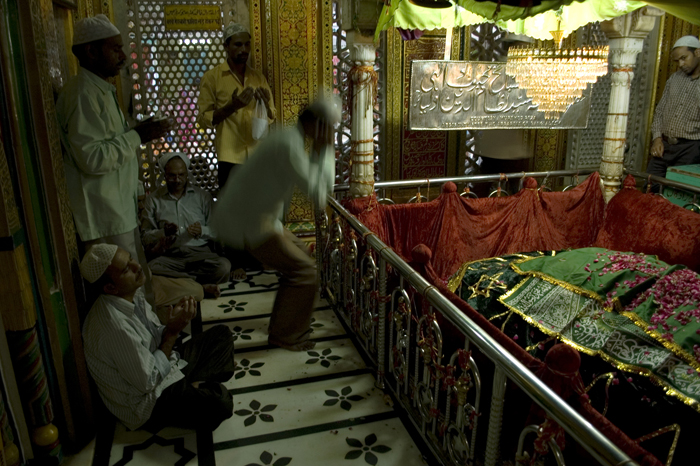Hazrat Nizam-ud-Din Aulia Mehmoob-e-Ilahi (rh)

Hazrat Nizamudeen Auliya (rahmatullahi alaihi) is known by many titles, and deservedly so, for he is one of the greatest saints that India has produced. It was this widely renowned and universally respected saint who continued the sterling work of Hazrat Baba Faridudeen (rahmatullahi alaihi) as the acknowledged head of the Chishtiyya silsila. Hazrat Nizamudeen Auliya (rahmatullahi alaihi) founded the Nizamiyya branch of the order just as Hazrat Sabir Paak (rahmatullahi alaihi) had founded the Sabriyya branch. Hazrat Nizamudeen Auliya (rahmatullahi alaihi) was born in Baduan in 636 A.h. to Hazrat Sayyid Ahmed Bukhari (rahmatullahi alaihi) a wali and noted jurist; but as with all the Big Five, he lost his father at a young age. His pious and highly intelligent mother ensured that he received spiritual and religious education from the foremost masters of the time. Due to his extraordinary intellect, he became an alim whilst still a child, but the fire in his heart soon turned him towards the path of the spirit. Hearing of the resounding reputation of Hazrat Baba Faridudeen (rahmatullahi alaihi), he became enamoured of the great saint and decided to meet him. Stopping for a time in Delhi, he heard the muezzin call out one night,
Has not the time come for the hearts of the faithful To remember Allah and bend by His love?

Thus Nizamudeen Auliya (rahmatullahi alaihi) moved to Delhi with his mureeds and settled in Ghyaspur, a secluded township where he could avoid the bustle of the huge city. This village soon became as busy as Delhi itself, and eventually he thought of leaving. Then however, he received a divine message through the tongue of a young sufi who said, "true courage lies in finding peace and seclusion amidst the bustle of the worldly crowd." Thus warned, he remained in Ghyaspur until his last breath. A khanqah was built for him by one of his mureeds, and soon became a mighty centre of learning. Under Hazrat Nizamudeen Auliya (rahmatullahi alaihi), the sun of the Chishtiyya silsila reached the zenith, and its power and influence attained heights that it has never equalled. In addition to being a spiritual master and distinguished alim, Nizamudeen Auliya (rahmatullahi alaihi) was also an administrative genius. Throughout India, he established literally thousands of khanqahs after the model of Shaykh Abdul Qadir al-Jilani's (rahmatullahi alaihi); he sent his khulafa across the length and breadth of the great nation, especially to the hitherto unexplored south. His primary khanqah in Delhi became a veritable fountain of divine wisdom and knowledge, and the centre of religious, moral and social education for hundreds of thousands of aspirants throughout the eastern Islamic world. Nizamudeen Auliya (rahmatullahi alaihi) lived for near a century, during which time Delhi witnessed the rise and fall of no less than seven kingdoms. Some of the sultans were the great saints devoted followers, others his avowed enemies. Despite many rich and influential men wishing to meet and pay homage to him, Nizamudeen Auliya (rahmatullahi alaihi) never entertained them, remembering Khwaja Moinudeen Chishti's (rahmatullahi alaihi) warning never to mix with the worldly. He used to say, "My khanqah has two doors. When they enter one, I will leave through the other." Because of his great generosity and influence, Nizamudeen Auliya (rahmatullahi alaihi) was extremely popular amongst the people of Delhi, and this naturally aroused the ire of kings and courtiers.
However, though his strongly held principles often led him to open conflict with the rulers, he absolutely refused to compromise the commandments of Shariah and traditions of Sufism.Once sultan Qutbuddin Khilji issued an edict that forbade anyone from donating any money to him; the saint responded by doubling his khanqah's expenses and increasing its beneficiaries to 16,000 every day.





 This is a free homepage created with page4. Get your own on www.page4.com
This is a free homepage created with page4. Get your own on www.page4.com